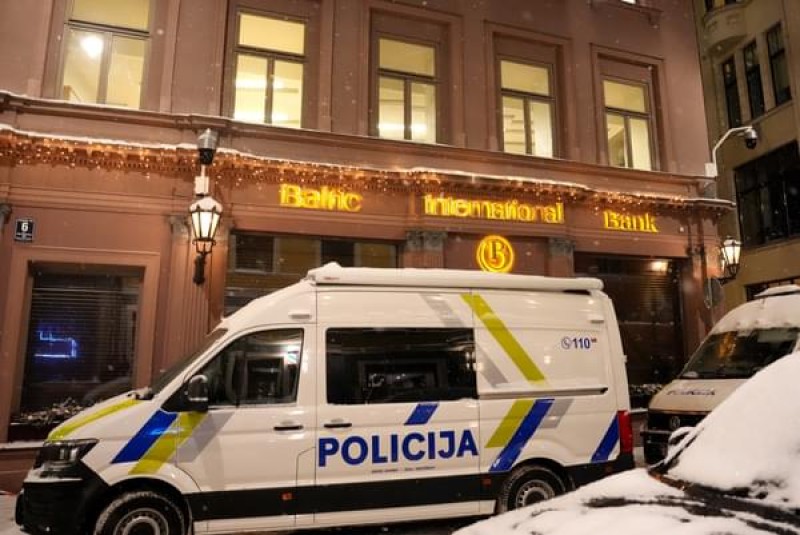The Baltic International Bank was previously subject to several OCCRP investigations, including one that revealed how it offered its clients written instructions on how to launder their money.
Before closing it, the Financial and Capital Market Commission (FCMC) raided the headquarters of the Baltic International Bank (BiB) in Riga’s Old Town as well as the homes of bank officials, Latvian media reported.
“The bank did not have an organized internal control system, including in the area related to the prevention of financial crimes," FCMC head Santa Purgaile told an initial press conference last week.
Investigative TV program ‘De Facto’ on Latvia’s public service broadcaster LSM reported on Sunday that the police investigation may be related to an attempt by new shareholders to inject funds into the bank.
The BIB presented in March three new investors from Switzerland and the United Arab Emirates, who reportedly plan to inject 12 million euros into the bank. But the FCMC and the European Central Bank (ECB) did not approve the new shareholders, whom ‘De Facto’ reports as having a background in gold trading and cryptocurrency.
FCMC’s Purgaile told ‘De Facto’ that the “shareholders and the bank had to submit a series of documents that would prove both the origin of the funds and a viable future strategy, as well as how the bank's management and internal control systems will be improved. We have not received such documents."
The shutdown comes after years of controversy over BIB’s operations, deriving from its customer base of offshore shell firms owned by wealthy individuals from former Soviet countries.
In 2011, OCCRP’s ‘Proxy Platform’ project investigated the money flows through a New Zealand-registered shell firm called ‘Tormex Limited,’ which banked at BIB.
Tormex had a strawman on file as dummy owner. Its accounts showed a billion dollars of secret payments in and out of Russia, Ukraine, and the U.S. among others. Tormex was also named by Canada’s financial intelligence unit FINTRAC as laundering money for Mexico’s Sinaloa drug cartel.
The ‘Proxy Platform’ investigation segued into a wider investigation into the laundering of US$230 million stolen by Russian officials and linked to the death of whistleblower Sergei Magnitsky. Shell firms banking at BIB helped obfuscate the trail of dirty money, the investigation found.
Baltic International Bank denied all of these allegations of money laundering.
In 2016, OCCRP revealed a ‘money laundering manual’ circulated to BIB clients.
The paperwork provided detailed instructions on how to draw up plausible fake trade invoices and contracts in order to hide the real nature of funds transferred via offshores. BIB denies any connection to the documents.
Following these investigations, BIB drew more attention from regulators. In 2016, it landed a $1.15 million fine from FCMC for violations of anti-money laundering regulations. In 2019 it received a $2 million fine from FCMC for lax money laundering controls.
Latvia’s offshore banks, catering to former Soviet countries, fell like dominoes after the West cracked down on Russian money following the 2014 Ukraine crisis. Trasta Komercbank was shuttered in 2016, ABLV in 2018 and Norvik Bank in 2019. But BIB remained standing.
Its longevity may speak to the high-level relationships forged by BIB’s enigmatic majority owner and chairperson, Valerijs Belokons.
BIB’s supervisory board includes Joseph Cofer Black, former head of Counter-terrorism at the CIA, and Hans Friedrich von Ploetz, former German ambassador to NATO.
Belokons’ personal contacts include Don Jr. Trump, son of former U.S. President Donald Trump, who addressed a BIB-organized conference in Riga in 2012 on the topic of family wealth. Belokons also met with Hunter Biden, son of current U.S. President Joe Biden, in New York in 2014, according to emails from Hunter Biden’s laptop.
Belokons also claims a “long standing friendship” with Britain’s King Charles III, having served as Trustee of The Prince’s Foundation 2010-2013.
On a local level, in 2020, Einars Repše, head of the Bank of Latvia from its founding in 1991 through to 2001, later finance minister and prime minister of Latvia, was named advisor to Belokons in 2020. Repše is a longstanding ally of the European Commission's vice president for economy, Valdis Dombrovskis.
Baltic International Bank was founded in 1993 by Belokons as a ‘private bank.’ Its motto was ‘Private Bank guards Private Life’.
Belokons was a recent convert to privacy. His first career, in Soviet Latvia, had been as a KGB officer, under cover of a journalist, BBC reported in 2018.
BIB business was based on a network of high net-worth individuals spanning the former Soviet countries.
A Global Witness investigation of 2013 showed that these included officials at the highest level – such as the family of Kurmanbek Bakiyev, President of Kyrgyzstan 2005-2010. Belekons co-founded Manas Bank in Kyrgyzstan with Bakiyev’s son Maksim during the presidency.
But in 2010 a popular revolution ousted the Bakiyev family from power. In 2017 Kyrgyzstan sentenced Belokons in absentia to twenty years in jail for his alleged role in laundering the Bakiyevs’ money. Belokons rejects the charge as politically motivated.
In contrast, Belokons led a charmed life in Latvia and in the U.K., where he was co-owner of Blackpool Football Club.



